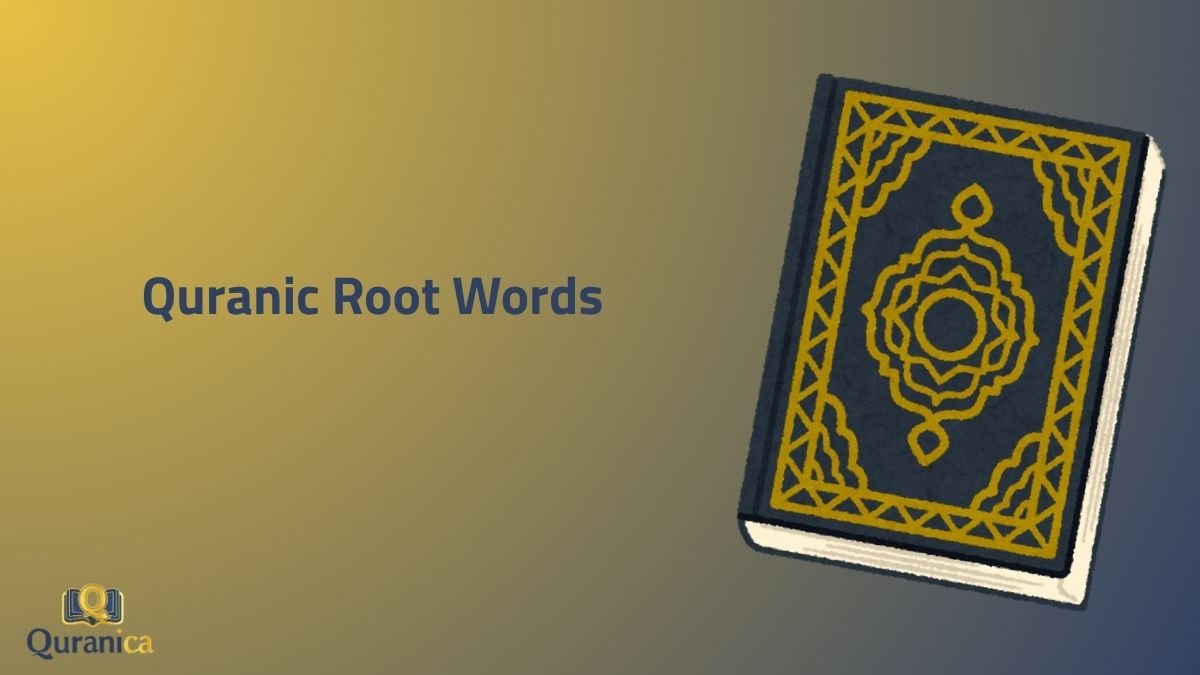In a nutshell: The Quran’s language is built on three-letter root words, forming a web of interconnected meanings. For example, ع ل م (A-L-M) expands into عِلم (knowledge), عَالِم (scholar), and عَلِيم (all-knowing), showcasing how words evolve while retaining their essence. This pattern appears throughout the Quran, with roots like ر ح م (mercy) shaping رَحْمَة (compassion) and رَحِيم (merciful).
For those seeking to connect deeply with the Quran, understanding Quranic root words is like discovering hidden treasures. Each root (جذر) branches into multiple words, enriching the text with layers of meaning. By studying these roots, you unlock the Quran’s eloquence and deepen your relationship with the Divine Word.
Quranic Roots:
Now, let us delve into how these root words expand into the rich vocabulary of the Quran. Imagine the root letters as seeds. When nurtured, these seeds sprout and branch out, forming various words that share a common underlying meaning. This derivation happens through the addition of other letters to the root, often vowels or extra consonants, which modify the core meaning in specific ways.
From a single set of root letters, multiple stem words (in Arabic, we call them masdar) can emerge, and from these stem words, even more words are derived . Think of it like a tree: the root gives rise to the trunk (stem words), and then branches bearing many leaves (derived words) grow from it. A wonderful example of this is the root ع ل م.
From this root, we get stem words like عِلم (ilm) meaning knowledge, and عَلمْ (alam) meaning a sign or world . From ilm, we then get words like يَعْلَمُ (ya’lamu) meaning he knows, عَليْم (aleem) meaning all-knowing, and عَالِم (aalim) meaning knowledgeable. From alam, we get عَالميْن (aalameen) meaning worlds or universes.
This root system is an incredibly efficient way to build vocabulary. Once you begin to recognize these patterns, understanding the meanings of new words becomes much easier. It is like having a key that can unlock the meaning of many doors at once.
To truly appreciate the power of Quranic root words, let us explore some significant examples that appear frequently in the Holy Book. By understanding these roots, you will gain profound insights into the meanings of countless verses.
1. The Root of Mercy: ر ح م (Ra-Ha-Ma)
The core meaning of this beautiful root revolves around tenderness, compassion, mercy, and even the womb – the very origin of nurturing life. The connection between the womb (رَحِّم – Rahim) and mercy is deeply ingrained in the Arabic language .
From this root, we derive many significant words:
- رَحْمَة (Rahmah): Meaning mercy or compassion
وَرَحْمَتِي وَسِعَتْ كُلَّ شَيْءٍ ۚ فَسَأَكْتُبُهَا لِلَّذِينَ يَتَّقُونَ وَيُؤْتُونَ الزَّكَاةَ وَالَّذِينَ هُمْ بِآيَاتِنَا يُؤْمِنُونَ
“My mercy encompasses all things. I will bestow it upon those who fear Me, pay alms-tax, and believe in Our verses.”
- رَحْمَن (Rahmaan): This is one of the beautiful names of Allah, meaning The Most Compassionate . It is an intensive form, indicating the vast and all-encompassing nature of Allah’s mercy. We begin every Surah (except one) with:
بِسْمِ ٱللَّٰهِ ٱلرَّحْمَٰنِ ٱلرَّحِيمِ
“In the name of Allah, the Most Compassionate, the Most Merciful.”
- رَحِيم (Raheem): Another glorious name of Allah, meaning The Most Merciful . While both Rahmaan and Raheem come from the same root, Raheem often indicates the continuous and constant manifestation of Allah’s mercy, particularly towards His believing servants. Again, we see this in the Basmala.
- أَرْحَم (Arham): This form signifies the most merciful (comparative/superlative). We find this in the Quran in descriptions like أَرْحَمَ الرَّاحِمِينَ (arhamar-raahimeen) – the most merciful of the merciful.
- رَحِم (Rahima – verb): Meaning He had mercy . In Surah Al-An’am (6:16), Allah says:
مَنْ يُصْرَفْ عَنْهُ يَوْمَئِذٍ فَقَدْ رَحِمَهُ ۚ وَذَٰلِكَ الْفَوْزُ الْمُبِينُ
“Whoever is spared from it on that Day – Allah has had mercy upon him. And that is the clear success.”
2. The Root of Knowledge: ع ل م (‘A-La-Ma)
This root carries the fundamental meaning of to know, to be aware, knowledge, and learning. It is a root that appears very frequently throughout the Quran highlighting the importance of knowledge in Islam.
Let us look at some of its derivatives:
- عِلْم (Ilm): Meaning knowledge or science:
وَقُلْ رَبِّ زِدْنِي عِلْمًا
“And say, ‘My Lord, increase me in knowledge.'”
- عَالِم (Aalim): Signifying one who knows, a scholar, or learned person.
- عَلِيم (Aleem): This is an intensive form meaning All-Knowing , often used to describe Allah’s comprehensive knowledge, as seen in the verse above.
- عَلَّمَ (Allama – verb): Meaning He taught.
- مَعْلُوم (Maloom): Meaning known .
3. The Root of Writing and Decree: ك ت ب (Ka-Ta-Ba)
This root encompasses the meanings of to write, to inscribe, to decree, and to ordain. It highlights the significance of both the written word – the Quran itself – and divine decree in Islam.
Consider these derived words:
- كِتَاب (Kitaab): Meaning book or scripture . Surah Al-Baqarah begins with:
ذَٰلِكَ الْكِتَابُ لَا رَيْبَ فِيهِ هُدًى لِلْمُتَّقِينَ
“This is the Book about which there is no doubt, a guidance for those conscious of Allah.”
- كَاتِب (Kaatib): Meaning writer or scribe.
- مَكْتُوب (Maktoob): Meaning written or decreed .
- يَكْتُبُونَ (Yaktuboon – verb): Meaning they write .
- كُتِبَ (Kutiba – verb, passive): Meaning it was written or decreed.
4. The Root of Sending and Message: ر س ل (Ra-Sa-La)
This root carries the core meaning of to send, to dispatch, message, and messenger . It is central to understanding the concept of prophethood and revelation in Islam.
Let us examine some derived words:
- رَسُول (Rasool): Meaning messenger or apostle.
وَمَا مُحَمَّدٌ إِلَّا رَسُولٌ قَدْ خَلَتْ مِنْ قَبْلِهِ الرُّسُلُ ۚ أَفَإِنْ مَاتَ أَوْ قُتِلَ انْقَلَبْتُمْ عَلَىٰ أَعْقَابِكُمْ ۚ وَمَنْ يَنْقَلِبْ عَلَىٰ عَقِبَيْهِ فَلَنْ يَضُرَّ اللَّهَ شَيْئًا ۗ وَسَيَجْزِي اللَّهُ الشَّاكِرِينَ
“Muhammad is not but a messenger. [Other] messengers have passed on before him. So if he was to die or be killed, would you turn back on your heels [to disbelief]? And whoever turns back on his heels will never harm Allah at all; but Allah will reward the grateful.”
- أَرْسَلَ (Arsala – verb): Meaning He sent.
- رِسَالَة (Risaalah): Meaning message or mission .
- مُرْسَل (Mursal): Meaning sent forth.
5. The Root of Faith and Belief: أ م ن (A-Ma-Na)
This root signifies to believe, to have faith, to be secure, and to trust. Notice the beautiful connection between faith and a sense of security.
Here are some important derived words:
- إِيمَان (Imaan): Meaning faith or belief .
- آمَنَ (Aamana – verb): Meaning He believed .
- مُؤْمِن (Mu’min): Meaning believer or faithful .
6. The Root of Guidance: ه د ي (Ha-Da-Ya)
Guidance is one of the most sought-after blessings, and this root signifies being led on the right path.
- هُدًى (Huda) – Guidance.
- هَادِي (Hadi) – Guide, often used as one of Allah’s names.
- مُهْتَدِي (Muhtadi) – One who is guided.
- يَهْدِي (Yahdi) – He guides.
إِنَّ هَذَا الْقُرْآنَ يَهْدِي لِلَّتِي هِيَ أَقْوَمُ
“Indeed, this Quran guides to that which is most upright.”
7. The Root of Worship: ع ب د (‘A-Ba-Da)
This root signifies servitude, submission, and worship.
وَمَا خَلَقْتُ الْجِنَّ وَالْإِنسَ إِلَّا لِيَعْبُدُونِ
“And I did not create the jinn and mankind except to worship Me.”
- عِبَادَة (Ibadah) – Worship.
- عَبْد (Abd) – Servant, slave.
- عَابِد (Aabid) – Worshiper.
- مَعْبُود (Ma’bud) – The one who is worshiped.
8. The Root of Forgiveness: غ ف ر (Gha-Fa-Ra)
Forgiveness is a recurring theme in the Quran, emphasizing Allah’s boundless mercy.
- مَغْفِرَة (Maghfirah) – Forgiveness.
- غَفُور (Ghafoor) – The Oft-Forgiving, one of Allah’s attributes.
وَاللَّهُ غَفُورٌ رَّحِيمٌ
“And Allah is Forgiving and Merciful.”
- غَافِر (Ghafir) – Forgiver.
- يَغْفِرُ (Yaghfiru) – He forgives.
9. The Root of Patience: ص ب ر (Sa-Ba-Ra)
Patience is a virtue praised repeatedly in the Quran.
- صَبْر (Sabr) – Patience, perseverance.
وَبَشِّرِ الصَّابِرِينَ
“And give glad tidings to the patient.”
- صَابِر (Sabir) – One who is patient.
- مُصْطَبِر (Mustabir) – Persistently patient.
- صَبَّار (Sabbar) – Intensely patient, steadfast.
Read more about: Quranic Arabic Words
Table of Common Quranic Root Words
Here are more examples of significant Quranic roots presented in a simple table format:
| Root (Arabic Script) | Root (Transliteration) | Core Meaning | Derived Word 1 (Meaning) | Derived Word 2 (Meaning) | Derived Word 3 (Meaning) |
| ه د ي | Ha-Da-Ya | To guide, show the way | هُدًى (Hudan): Guidance | يَهْدِي (Yahdee): He guides | مُهْتَدِين (Muhtadeen): Those who are guided |
| ذ ك ر | Dha-Ka-Ra | To remember, mention | ذِكْر (Dhikr): Remembrance, mention | يَذْكُرُونَ (Yadhkuroon): They remember | تَذْكِرَة (Tadhkirah): Reminder |
| ع م ل | ‘A-Mi-La | To do, work, act | عَمَل (Amal): Deed, action | يَعْمَلُونَ (Ya’maloon): They do | عَامِلِين (Aamileen): Workers |
| ق و ل | Qa-Wa-La | To say, speak | قَوْل (Qawl): Saying, speech | يَقُولُ (Yaqoolu): He says | قَالُوا (Qaaloo): They said |
| خ ل ق | Kha-La-Qa | To create, bring into existence | خَلْق (Khalq): Creation | خَالِق (Khaaliq): Creator | مَخْلُوق (Makhlooq): Created being |
| أ م ر | Hamza-Meem-Ra | To command, order | أَمْر (Amr): Command, affair | يَأْمُرُ (Ya’muru): He commands | أُمِرُوا (Umiroo): They were commanded |
| ن ص ر | Noon-Saad-Ra | To help, assist | نَصْر (Nasr): Help, victory | يَنْصُرُ (Yansuru): He helps | نَاصِرِين (Naasireen): Helpers |
| س م ع | Seen-Meem-‘Ayn | To hear, listen | سَمْع (Sam’): Hearing | يَسْمَعُونَ (Yasma’oon): They hear | سَمِيع (Samee’): All-Hearing |
| ب ص ر | Ba-Saad-Ra | To see, perceive | بَصَر (Basar): Sight, vision | يُبْصِرُونَ (Yubsiroon): They see | بَصِير (Baseer): All-Seeing |
| ح س ب | Ha-Seen-Ba | To reckon, account | حِسَاب (Hisaab): Reckoning, account | حَاسِبِين (Haasibeen): Those who take account | |
| ف ض ل | Fa-Dha-La | To favor, bestow bounty | فَضْل (Fadl): Favor, bounty | يُفَضِّلُ (Yufaddilu): He favors | |
| ح ق ق | Ha-Qaf-Qaf | To be true, real | حَقّ (Haqq): Truth, right | حَقِيق (Haqeeq): True, certain | |
| ك ف ر | Ka-Fa-Ra | To disbelieve, deny | كُفْر (Kufr): Disbelief | كَافِرِين (Kaafireen): Disbelievers | يَكْفُرُونَ (Yakfuroon): They disbelieve |
| ش ك ر | Sheen-Kaaf-Ra | To thank, be grateful | شُكْر (Shukr): Gratitude, thanks | يَشْكُرُونَ (Yashkuroon): They thank | شَاكِرِين (Shaakireen): Grateful ones |
| ص ب ر | Saad-Ba-Ra | To be patient, persevere | صَبْر (Sabr): Patience, endurance | يَصْبِرُونَ (Yasbiroon): They are patient | صَابِرِين (Saabireen): Patient ones |
| خ و ف | Kha-Waw-Fa | To fear, be afraid | خَوْف (Khawf): Fear | يَخَافُونَ (Yakhafoon): They fear | |
| ر ج ع | Ra-Jeem-‘Ayn | To return, revert | رُجُوع (Rujoo’): Return | يَرْجِعُونَ (Yarjioon): They return | رَاجِعِين (Raajieen): Those who return |
| ن ز ل | Noon-Za-Laam | To descend, send down | يُنَزِّلُ (Yunazzilu): He sends down | مُنْزَل (Munzal): Sent down | |
| ف ت ن | Fa-Ta-Noon | To test, tempt, try | فِتْنَة (Fitnah): Trial, temptation | يَفْتِنُونَ (Yaftinoon): They test | |
| ب ي ن | Ba-Ya-Noon | To be clear, evident | بَيِّنَة (Bayyinah): Clear proof | يَتَبَيَّنُ (Yatabayyanu): It becomes clear | مُبِين (Mubeen): Clear, manifest |
Strengthen Your Quranic Arabic with Quranica
At Quranica, we understand the importance of this foundational knowledge. Studying Quranic root words is a key to unlocking the deep meanings of the Quran. At Quranica, we offer specialized courses in Quranic Arabic to help students connect with the divine message in its purest form.
Join Quranica today and deepen your knowledge of the Quran!
Our native experienced teachers, with their passion for the Quran, will guide you every step of the way, making this journey both enriching and rewarding.
Conclusion
The Quran’s vocabulary is deeply rooted in a system where three-letter root words act as the foundation for numerous related terms. This structure allows a single root to branch into various forms, each carrying a nuanced meaning. For example, the root ع ل م (A-L-M) generates words like عِلم (ilm – knowledge), عَالِم (aalim – scholar), and عَلِيم (aleem – all-knowing), illustrating how meanings evolve through different grammatical patterns. Recognizing these patterns makes it easier to understand the Quranic text, as words with shared roots maintain a core conceptual link.
Many of the Quran’s most profound themes—such as mercy (ر ح م), faith (أ م ن), and guidance (ه د ي)—stem from these root structures. For instance, رَحْمَة (rahmah – mercy), رَحْمَن (Rahmaan – Most Compassionate), and رَحِيم (Raheem – Most Merciful) all originate from the same root, emphasizing Allah’s boundless mercy. Similarly, the root ك ت ب (Ka-Ta-Ba) gives rise to words like كِتَاب (kitaab – book) and مَكْتُوب (maktoob – written/decreed), signifying divine scripture and decree.








0 Comments